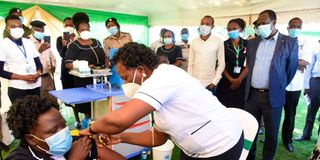Supporting women and supporting nurses two sides of the same coin

Kakamega Governor Wycliffe Oparanya (right) looks on as Beverlyne Wambani, a nursing officer at Kakamega County Referral Hospital, administers the AstraZeneca Covid-19 vaccine to Head of Nursing Jacinta Angie at the facility on March 12, 2021.
What you need to know:
- In Kenya, this is as high as 85 per cent, meaning that nurses have borne the heaviest burden during the pandemic.
- Some 76 per cent of nurses in Kenya are women, meaning most of our frontline healthcare workers were women.
This year’s Women’s Month was especially unique as it came at a time when the world was re-emerging from the grasp of a deadly pandemic. I believe we must celebrate women, even more this year, since in many countries they were the ones who bore the brunt of the effect of the Covid-19 pandemic in families and on the frontline as nurses provided the much-needed care and support.
According to the “State of the World’s Nursing 2020” report by the World Health Organization (WHO), nurses are the largest occupational health professionals, occupying 59 per cent of the health sector.
In Kenya, this is as high as 85 per cent, meaning that nurses have borne the heaviest burden during the pandemic. Some 76 per cent of nurses in Kenya are women, meaning most of our frontline healthcare workers were women.
The report articulates the gendered nature of nursing and it’s, perhaps, the first time we have seen the world acknowledge these challenges. Nurses are rarely given leadership positions, not invited to the decision-making table or even involved in policymaking despite forming the bulk of healthcare professionals. The gender inequalities within the wider society also prevail in the nursing profession.
A key strategy to empowerment of nurses and, by default, women is through access to higher education. But, as women, we often find ourselves in situations where it seems we are forced to choose between family and career and, somewhere in between these, we also have to find time for ourselves.
Most women, without goodwill from the various workplaces or support structures, will often sacrifice their careers to take care of the home front.
Whereas there is nothing wrong with that, it contributes to the lack of educational progression, which, in turn, contributes to the minimal number of women in leadership and decision-making positions across all professions but especially in nursing.
This is why it is crucial for those who say they support women empowerment to understand the different circumstances that hinder their growth actively work to support them through these challenges.
Integration and balance
The pandemic has hurt several of our frontline workers, who are women. However, I believe it has been beneficial to some women. It has helped with integration and balance when it comes to supporting their families, finding time for work, finding time for themselves and other responsibilities.
Work-from-home (WFH) means a woman does not have to be limited by the need to be physically present all the time when the situation does not warrant it. It would be important to test the validity of this model post-pandemic.
We must support the nursing profession since, by extension, we will be supporting women. As the rest of the world has been isolating, nurses have been on the frontline saving lives.
They have seen patients survive the worst effects of the pandemic and bid farewell to those who succumbed to the virus.
However, nurses are human beings too. They face uncertainty and fear but have to repress their emotions for the sake of everyone else and to continue providing the vital care and support. They, too, have been affected by the pandemic physically and psychologically.
As a result, funding for projects that prioritise the physical and mental well-being of frontline healthcare workers, particularly nurses, would be vital to safeguard their mental health and wellbeing.
I am proud to be part of a Johnson & Johnson Foundation research project focusing on resilience and mental health among frontline workers in the context of Covid-19.
Lastly, to help our women on the frontline, it is imperative to increase the investment in nursing education so that we have more girls, particularly those from rural and remote areas.
We do know now that there is a positive impact of educating the girl-child as it then contributes to intergenerational mobility and improves the livelihood of the rest of the family and society. Women are the backbone of our health systems; let us support them.
Dr Ndirangu-Mugo is an associate professor and dean at the Aga Khan University School of Nursing and Midwifery, East Africa. [email protected].





